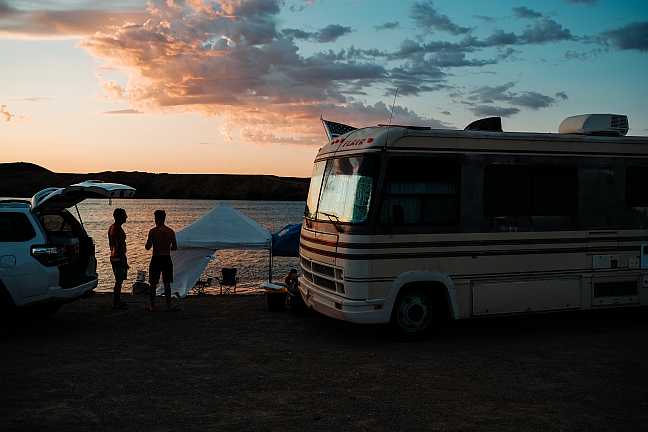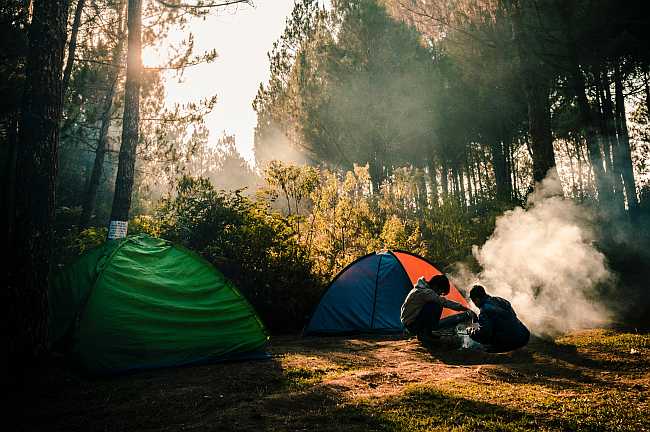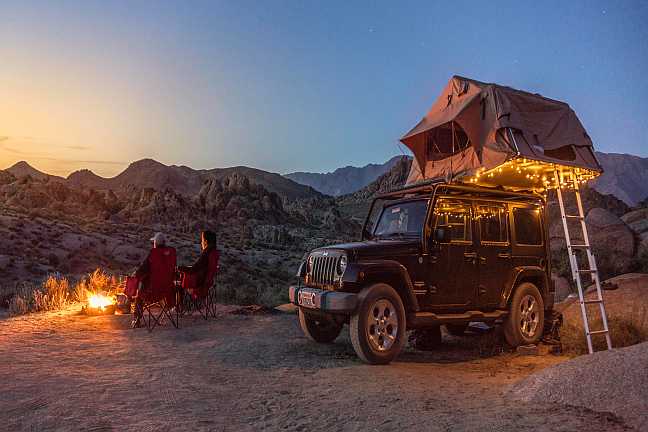Camping and RVing – when it comes to either of these pastimes, they’re not necessarily mutually exclusive.
These days, there’s also some degree of overlap too with rooftop tents being used atop of cars which purists argue isn’t real camping.
Between camping and RVing, each is quite different. Camping provides inexpensive freedom without needing too many possessions to enjoy it. RVing offers home-on-wheels, greater creature comforts, and the ease of transportation.
Which is the right choice? Let’s examine both and see how they stack up.
Read Also: Difference Between Motorhome and RV

What is Camping?
Camping is essentially outdoor living.
This might be for a weekend trip with the family or as a solo traveler. It can also be for longer periods too.
People go camping in a variety of ways. These can include:
- Tent camping
- Car camping
- Sail camping
- Canoe camping
- Kayak camping
- Off-road camping
- and more…

The idea is to use alternative means of creating temporary accommodation for yourself. This can then be packed up when breaking camp and then traveling on to the next destination.
Who Invented Camping?
Thomas Hiram Holding is credited with inventing the concept of recreational camping.
He spent time in the Prairies camping recreationally with several hundred people and then later returned to the UK. There he later canoe camped in Scotland.
Also, later he traveled by bicycle to visit different small villages and found free camping spots along the way. This was back in the late 1800s and early 1900s when there weren’t commercial campgrounds available.
By 1908, the Campers’ Handbook [affiliate link] had been released detailing his various adventures. The UK-based Camping and Caravanning Club, an organization around camping concepts, was created later and still exists to this day. Before that, the book Cycle and Camp, detailed his cycling touring too.
It took another 50 years before camping was seen as safe enough and subsequently became a popular pastime in the U.S. and across Europe too.
Read Also: 11 Safe Places to Park Your RV Overnight for Free
What is RVing?
RVs allow you to take your home with you.
RVs
RVing is a form of motorized recreational vehicle (RV) that is driven from destination to destination.
They are large enough to have a front cab, plus a living space and a bedroom facility for overnight sleeping.
Campers and Trailers
We’re also including the use of tow campers or trailers here. These are not motorized but are towed behind another vehicle, such as a car or truck, that is.
In this scenario, the vehicle is used for transportation and storage – the camper is for sleeping, cooking food, and some are equipped with toilets or showers too.
Also, trailers are used to transport sporting equipment like ATVs, 4x4s, dirt bikes, and fishing gear to an outdoor location.
Read Also: Regular Toilet in RV?
When Did RVing First Become Popular?
The first known use of motorized vehicles was in the early 1900s.
These were mainly used by salespeople, performers, artists, and other people who needed to cover considerable distances between towns, and then park up and sleep when they lost the light.
Since the 1950s, the market has been divided between RVs for recreational use and ones as mobile homes for a static living.
Read Also: RV Dump Station Cost
Does the Length of Stay in an RV Change the Meaning?
People who take their RV on short weekend trips or to tour for a couple of weeks around their home state are often referred to as campers.
This might apply regardless of whether they use a tent, awning, or other covering with their RV or not.
For RVers who spend a sustained period moving around, seeing the sights, and treating it as their traveling home, they’re often referred to as travelers.
Whilst some travelers may spend time in the same national parks as campers, the former takes it far more seriously than the latter.
They’ve usually set up their RV to be a home away from home with as much comfort as they can provide for themselves.
It may indeed be their semi-permanent or permanent home regardless of whether they stay on private or public land, boondock on the Bureau of Land Management (BLM) land; or go elsewhere.
Read Also: RV Hacks for Dogs
More Conveniences with RVing or Camping?
Is RVing or Camping easier for day-to-day living?
RVs for More Creature Comforts
With RVs, there’s power available through the generator or by running the engine for a while to charge the batteries.
Some owners choose to fit a solar-powered system with batteries to create electricity and be able to store it. Within the limits of the available power, some electrical RV appliances can be run including a cooker, TV, and, more.
Most electrical systems in an RV run on 12-volt power with some also providing access to regular power outlets through an inverter. Then USB ports are accessible through accessories too.
When staying in an RV park, full hook-ups are often available which provide onshore power supply, water supply, and facilities to offload the gray or black water tanks.
Read Also: How Long Do Travel Trailers Last?
Camping for a Truly Minimalistic Lifestyle
With camping in a tent, you’re typically reliant on what you bring with you.
This might include a charged power bank to keep your mobile devices alive, a gas-powered camping stove, and a cooler to keep food fresh for longer (and drinks colder too).

When using transportation, charging up electronic devices is possible.
The cooler or travel refrigerator may work better inside the car if it’s actively cooled too (the ambient temperature near a refrigerator or cooler impacts how cold it’ll be inside).
Campgrounds designed for tent camping may also have facilities such as a restaurant or small store to stock-up on essentials.
Read Also: 15 RV Driving Tips for New RVers-Learn to Drive an RV
Is Camping More Flexible than RVing?
Due to tents packing down well and being reasonably portable, there continues to be an expansion of how and where tents are being used.
Not only does tent camping remain popular with many campgrounds available but the modes of transportation to reach the campgrounds are evolving too.
For instance, someone can go kayak camping with a kayak, a cooler for food and drinks, and a tent to paddle down the river and camp where they see a likely spot.
Similarly, there’s even sail camping and row camping where adventurous people combine the use of a small boat with a tent when back on land.
Read Also: Walmart RV parking
Is There Any Overlap Between RVing and Camping?
There sure is!
Here are some examples of how different types of awnings and/or tents are being used to augment the RVing or travel experience.
RV Awnings
There are RV awnings [affiliate link] that fit atop an RV and can be pulled out and erected when at a campsite. These sun canopy awnings are quite basic, yet they protect you from the sun and allow you to keep the door open for added ventilation during hotter days.
These types of awnings pack away neatly and get zipped up in a special case fitted to a roof rack system.
Slide-out awnings for larger RV models are another possibility too.
RV Awning Rooms
RV awning rooms take it to the next level [affiliate link].
These are complete, contained outdoor spaces with secured side panel doors and zip mechanisms. They provide greater outdoor space on sites where there’s enough space to erect them.
Read Also: Leaving Pets in RV
Camper & Trailer Tents
Camper tents and trailer tents aka “shade canopies” [affiliate link] are designed to be attached to the side of a towable camper or trailer.
These provide a place to sit down and enjoy some sun protection and a cool breeze. They’re typically open at either side providing access from the camper or trailer door to the exterior.
Rooftop Tents
Rooftop tents are another spin on mixing camping with mobility. [affiliate link]
These come in various designs and are put on a vehicle’s roof and sometimes extend outwards beyond it too.

For short trips in a car or truck that may not have the towing capacity to pull a mid-sized camper or trailer, this rooftop tends has recently become a popular alternative.
Also Read: Why are RV Parks So Expensive?
Camping or RVing? Which is Right for You?
Like many things in life, the answer is – it depends.
For affordability and when wanting to travel light and get up and go, you cannot beat tent camping.
However, you do sacrifice many comforts and ease of living to enjoy that slice of freedom.
For people who prefer to have solid walls between them and the outside world when they’re sleeping, then an RV or camper provides more facilities, comfort, and greater security.
